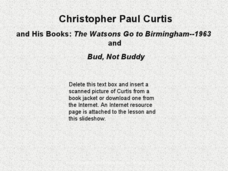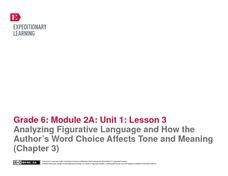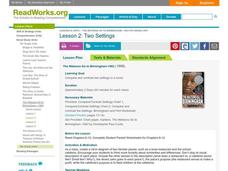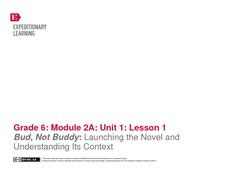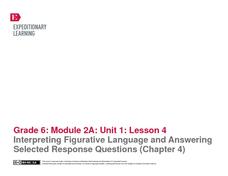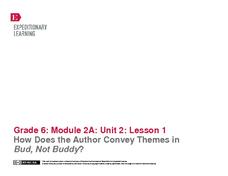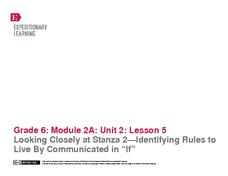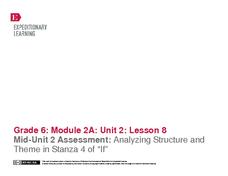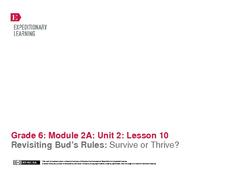Christopher Paul Curtis Teacher Resources
Find Christopher Paul Curtis lesson plans and worksheets
Showing 53 resources
Alabama Learning Exchange
Christopher Paul Curtis
Introduce your readers to the famous author, Christopher Paul Curtis in this literature PowerPoint. They are introduced to the author, and two of his books: The Watsons go to Birmingham - 1963, and Bud, Not Buddy. This presentation would...
Curated OER
Bud, Not Buddy by Christopher Paul Curtis
Fifth graders embark on a literary journal with Bud in Bud, Not Buddy. They first read the novel Bud, Not Buddy by Christopher Paul Curtis. A time line is made from the novel along with a Venn Diagram.
Curated OER
Compare Characters in Bud, Not Buddy
After your class finishes reading Bud, Not Buddy by Christopher Paul Curtis, they use the Venn diagram here to compare two characters from the novel, in this case Bud and his grandfather Herman E. Calloway. Examples of qualities on which...
EngageNY
Analyzing Figurative Language and How the Author’s Word Choice Affects Tone and Meaning (Chapter 3)
How figurative language affects the tone and meaning in Chapter Three of Christopher Paul Curtis' Bud, Not Buddy is the focus of a series of exercises that ask readers to locate, record, and analyze Curtis' word choices.
EngageNY
Mid-Unit 1 Assessment: Figurative Language and Word Choice in Bud, Not Buddy (Chapter 5)
Individuals utilize the strategies practiced in the previous lesson to complete a mid-unit assessment on figurative language and how Christopher Paul Curtis uses word choice to create meaning in Bud, Not Buddy.
Curated OER
Two Settings
Fifth graders analyze two settings. In this compare and contrast lesson students compare and contrast the settings in The Watsons Go to Birmingham-1963 by Christopher Paul Curtis. Students find and record similarities and differences of...
Digital Public Library of America
The Watsons Go To Birmingham—1963 by Christopher Paul Curtis
A primary source set of photographs, videos, newspaper articles, and FBI reports provides insight into race relations during the 1960s, the Sixteenth Street Baptist Church bombing, and the murder of Emmitt Till. Designed to be used to...
EngageNY
Getting the Gist and Determining Word Meaning: Paragraphs 20–23 of Steve Jobs’ Commencement Address (and connecting to Chapter 10)
Groups create a list of the character traits of Steve Jobs and Buddy, the main character of Christopher Paul Curtis' Bud, Not Buddy, and share and select evidence from Jobs' 2005 Stanford University Commencement Address to support their...
EngageNY
Bud, Not Buddy: Launching the Novel and Understanding Its Context
The first lesson plan in a unit that uses Christopher Paul Curtis' award-winning depression-era novel, Bud, Not Buddy, as the anchor text establishes the routines that will be used throughout the unit.
EngageNY
Interpreting Figurative Language and Answering Selected Response Questions (Chapter 4)
To prepare for an assessment of how well individuals are progressing with their ability to identify and analyze figurative language and its effect on tone and meaning, pairs work through Chapter Four of Christopher Paul Curtis'...
EngageNY
How Does the Author Convey Themes in Bud, Not Buddy?
After reading up to chapter 12 of Bud, Not Buddy by Christopher Paul Curtis, scholars read chapter 13 and take part in a grand conversation about the author's writing techniques. Pupils discuss how his writing conveyed literary themes...
EngageNY
Looking Closely at Stanza 1—Identifying Rules to Live By Communicated in “If”
Here is a lesson plan in which pupils connect themes and rules to live by from the story Bud, Not Buddy by Christopher Paul Curtis to those found in the poem If by Rudyard Kipling. First, scholars discuss their reading and review Bud's...
EngageNY
Introducing “If” and Noting Notices and Wonders of the First Stanza
After reading chapter 14 of the story Bud, Not Buddy by Christopher Paul Curtis, scholars take part in a read-aloud of the poem If by Rudyard Kipling and compare it to the reading of Bud, Not Buddy. Learners then go deeper into the poem...
EngageNY
Notices and Wonders of the Second Stanza of “If”
Here is an instructional activity that asks pupils to analyze poetry and sparks discussion about two different types of texts: asking how is the poem, If by Rudyard Kipling alike and different from the story, Bud, Not Buddy by...
EngageNY
Looking Closely at Stanza 2—Identifying Rules to Live By Communicated in “If”
Pupils take part in a close reading of the poem, If by Rudyard Kipling, in which they delve deep into its meaning and identify its rules to live by. As the grand discussion progresses, learners then relate the poem's rules with those...
EngageNY
Looking Closely at Stanza 3—Identifying Rules to Live By Communicated in “If”
Just as Bud, from the novel Bud, Not Buddy by Christopher Paul Curtis, had rules to live by, so does the poem, If by Rudyard Kipling, but how do the two relate? Pupils delve deep into the poem's third stanza, participate in a grand...
EngageNY
Writing: Drafting Body Paragraphs and Revising for Language
Begin the drafting phase of the writing process with a lesson plan focused on logically writing three body paragraphs. Then, revise the writing to make it more formal after a teacher-directed mini-lesson plan. Each paragraph highlights...
EngageNY
Planning for Writing: Introduction and Conclusion of a Literary Argument Essay
After completing three body paragraphs of an argument essay about life's rules to live by from Bud, Not Buddy Christopher Paul Curtis, it's time to begin writing the introduction and conclusion. Independently, pupils draft the final two...
EngageNY
Introducing Research Folders and Generating a Research Question
Take the next step in the writing process with a lesson plan geared towards the completion of writing an evidence-based essay about a rule to live by, as Bud did in Bud, Not Buddy by Christopher Paul Curtis. Pupils collaborate with their...
EngageNY
End of Unit 2 Assessment: Final Draft of Literary Argument Essay
Take the last step in writing a literary argument essay using Bud, Not Buddy by Christopher Paul Curtis in an activity focused on feedback. Using the stars and steps revision method, pupils consider teacher and peer feedback to revise...
EngageNY
Qualities of a Strong Literary Argument Essay
One activity, two essays, and one central theme: qualities of an argument essay. Here, scholars first describe the qualities of an argument essay regarding Bud's rules to live by from the novel Bud, Not Buddy by Christopher Paul Curtis....
EngageNY
Analyzing Structure and Theme in Stanza 4 of “If”
Here is a lesson that provides scholars with two opportunities to stretch their compare-and-contrast muscles. First, learners compare and contrast their experience reading the fourth stanza of If by Rudyard Kipling to listening to the...
EngageNY
Revisiting Bud’s Rules: Survive or Thrive?
Bud followed a series of rules from Bud, Not Buddy by Christopher Paul Curtis. The question is, how did he use those rules to thrive or survive? After a grand discussion, class members explore the novel to locate and cite textual...
EngageNY
Pitching Your Claim with Best Evidence
Does Bud use his rules to survive or thrive? That is the driving question of a lesson plan following the reading of Bud, Not Buddy by Christopher Paul Curtis. In an argument essay prewriting activity, pupils use textual evidence to...


